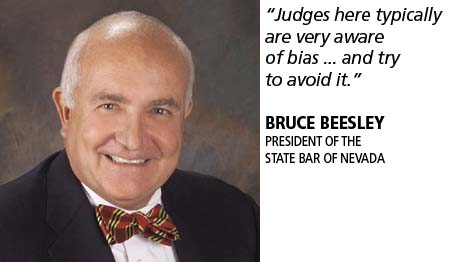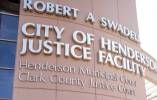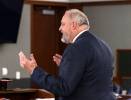Court rules on elected judges
In a decision that could affect Nevada's judges, the U.S. Supreme Court ruled Monday that elected judges must step aside when huge campaign contributions from interested parties create the appearance of bias.
The ruling focused on a West Virginia Supreme Court justice who remained involved in a lawsuit filed against the company of a generous supporter. The judge deprived the other side of its constitutional right to a fair hearing by staying on the case, the court ruled.
Legal experts said more judges in Nevada might start removing themselves from cases involving parties who've made contributions to them to avoid the perception of bias. Others said the ruling opened a door for lawyers who want to get judges kicked off cases.
"For a state like Nevada, it's going to put an additional burden on the system," said William Dressel, president of the National Judicial College in Reno. "It's going to make a judge think twice (about staying on a case)."
Dressel, who served as a judge in Colorado for 22 years, said the issue isn't just whether a judge can be fair or impartial but whether a judge is perceived to be biased. He spoke as a retired judge and citizen.
Nevada is one of 39 states where judges are elected.
The West Virginia case involved more than $3 million spent by the chief executive of Massey Energy Co. to help elect state Supreme Court Justice Brent Benjamin, according to The Associated Press.
At the same time, Massey was appealing a verdict -- which now totals $82.7 million with interest -- in a dispute with a local coal company. Benjamin refused to step aside despite repeated requests and was part of a 3-2 decision to overturn the verdict.
The coal company, Harman Mining Co., and its president, Hugh Caperton, appealed the decision to the Supreme Court.
"Not every campaign contribution by a litigant or attorney creates a probability of bias that requires a judge's recusal, but this is an exceptional case," said Justice Anthony Kennedy in the 5-4 decision.
Kennedy said that the case, Caperton v. A.T. Massey Coal Co., was highly unusual and probably wouldn't be repeated. Kennedy said that states already have codes of judicial ethics and conduct that determine when judges should or shouldn't remove themselves from a case.
Justices Stephen Breyer, Ruth Bader Ginsburg, David Souter and John Paul Stevens joined Kennedy's opinion.
Chief Justice John Roberts wrote in dissent that he shares concerns about maintaining an impartial judiciary. "But I fear that the court's decision will undermine rather than promote these values," Roberts said.
Justices Samuel Alito, Antonin Scalia and Clarence Thomas also dissented.
Judges in Nevada generally must recuse themselves from cases if they have a family relationship with an interested party or a financial interest in the case. They also should remove themselves if they have an actual bias against one of the parties.
They are not required to step away from a case just because they received a campaign contribution from an interested party. In Nevada, individuals can contribute no more than $10,000 to a judicial candidate.
Clark County Chief District Judge Art Ritchie said that the $10,000 cap on contributions is a protection against improper influence. He added that state judges are generally cautious about biases.
Ritchie was appointed a judge by Gov. Kenny Guinn in 1999 and then was retained by election in 2000, 2002 and 2008.
State Bar of Nevada President Bruce Beesley said it's very common for parties to complain that a judge is biased, but it's rarely true. Beesley said Nevada judges usually recuse themselves when even a hint of bias arises.
He recalled one case in which a federal bankruptcy judge recused himself because he had received a $200 campaign contribution from one of the parties about a decade earlier.
"Judges here typically are very aware of bias ... and try to avoid it," he said.
In the West Virginia case, Kennedy said the $3 million spent by Massey chief executive Don Blankenship to unseat the incumbent justice "had a significant and disproportionate influence in placing Justice Benjamin on the case," according to The Associated Press.
The case now returns to the West Virginia court for a new hearing.
The dissenters said the court's inability or unwillingness to set clear rules for when judges must step aside will provoke endless lawsuits aimed at forcing judges off cases.
"It is an old cliché, but sometimes the cure is worse than the disease," Roberts said. He wrote that it is not clear that Blankenship's money affected the outcome of the election.
Both Scalia and Roberts said that the ruling would end up undermining confidence in the judicial system.
The ruling also gives attorneys a tactic for getting judges kicked off a case. Dressel said an attorney could give contributions to a judicial candidate they don't want to hear a certain case if elected or retained.
University of Nevada, Las Vegas law professor Steve Johnson agreed.
He said he doubts judges would be forced to remove themselves from a case in light of the Supreme Court's ruling.
But lawyers claiming the perception of bias now might file more requests to have a judge removed.
"What a lawyer does is push the envelope," he said.
The Associated Press contributed to this report. Contact reporter David Kihara at dkihara@reviewjournal.com or 702-380-1039.




























